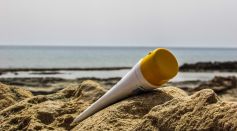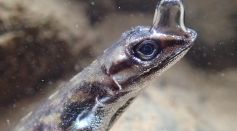ENVIRONMENT & CLIMATE

New Sunscreen Ingredient Gives UV Protection, Swimmers Not Harming Coral Reefs
Critically-Endangered Tree Produces Flower; Report Says It's a Never-Before-Recorded Occurrence
Giant Tortoise Still Roams Galapagos Islands After Being Thought to be Extinct 100 Years Ago
Greyhound Dog with Lymphoma Receives New Vaccine That Has Anti-Cancer Effects in Various Tumors

Virus Potentially Fatal to Humans Found in 3 Dead Birds for the First Time in Sacramento County
Extinct Dwarf Emu Egg Discovered in Sand Dune, a First of Its Kind
5-Year-Old Birthday Boy Finds Four-Inch Megalodon Shark Tooth from Millions of Years Ago
Earthquake in Mauna Loa Could Trigger the Largest Volcanic Eruption
Ancient Plant Fossils Help Explain the Rise of Flowering Plants
Great White Shark Population Growing: Now Totaling 300 Individuals Off Northern California's Coast
Thick Sea Snot Covers the Sea of Marmara in Turkey, Could It Be Due to Climate Change?
After 3,000 Years, First Tasmanian Devil Born in Wild Australian Mainland

Costa Rica Water Lizard Uses Bubble Snouts to Scuba Dive in 16 Minutes
NASA's Earth System Observatory to Study How Climate Change Fuels Natural Disasters
Most Popular

NASA Reveals an Astronaut Was Medically Evacuated From the ISS for the First Time After a Non-Emergency Health Scare

How the Immune System Fights Diseases: Antibodies, Vaccines & Lasting Protection

Why Biodiversity Matters More Than We Think: How Species, Ecosystems, and Conservation Shape Our Planet

Sun Reaches Solar Maximum: What the Intensifying 11-Year Solar Cycle Means for Earth





